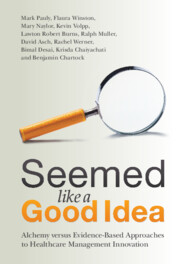 Seemed Like a Good Idea
Seemed Like a Good Idea Book contents
- Seemed Like a Good Idea
- Seemed Like a Good Idea
- Copyright page
- Contents
- Figures
- Contributors
- Preface
- 1 Baseline Observations
- 2 Evidence and Growth in Aggregate Spending and Changes in Health Outcomes
- 3 The Benchmark Decision Model, the Value of Evidence, and Alternative Decision Processes
- 4 Care Coordination
- 5 Evidence-Based Programs to Improve Transitional Care of Older Adults
- 6 Vertical Integration of Physicians and Hospitals
- 7 Evidence on Provider Payment and Medical Care Management
- 8 Evidence on Ways to Bring about Effective Consumer and Patient Engagement
- 9 The Unmet and Evolving Need for Evidence-Based Telehealth
- 10 Evidence and the Management of Health Care for Disadvantaged Populations
- 11 Driving Innovation in Health Care
- 12 Concluding Chapter
- Index
3 - The Benchmark Decision Model, the Value of Evidence, and Alternative Decision Processes
Published online by Cambridge University Press: 14 July 2022
- Seemed Like a Good Idea
- Seemed Like a Good Idea
- Copyright page
- Contents
- Figures
- Contributors
- Preface
- 1 Baseline Observations
- 2 Evidence and Growth in Aggregate Spending and Changes in Health Outcomes
- 3 The Benchmark Decision Model, the Value of Evidence, and Alternative Decision Processes
- 4 Care Coordination
- 5 Evidence-Based Programs to Improve Transitional Care of Older Adults
- 6 Vertical Integration of Physicians and Hospitals
- 7 Evidence on Provider Payment and Medical Care Management
- 8 Evidence on Ways to Bring about Effective Consumer and Patient Engagement
- 9 The Unmet and Evolving Need for Evidence-Based Telehealth
- 10 Evidence and the Management of Health Care for Disadvantaged Populations
- 11 Driving Innovation in Health Care
- 12 Concluding Chapter
- Index
Summary
It seems so obvious that good decisions on innovations in medical and hospital management – or on anything – should be based on good evidence. Decision-makers are advised by business school professors (and their mothers) that decisions should be based on the best available evidence – and who could argue against that? However, despite the general reverence for evidence in medical practice and drug approval, there is a consensus (discussed later in this chapter) that decision-making on medical delivery or insurance innovations – which also can have effects on health, life, death, and spending – is often not evidence-based, sometimes contradictory to evidence, and surely not as evidence-based as it could be. In this introductory chapter we explore two related questions: (1) what is the value of evidence for these decisions, and (2) where in health care management is evidence not being generated or used as it should be? This chapter will in a sense discuss “evidence on evidence,” and ask when and what kind of evidence is needed to improve not only decision-making, but also final outcomes in terms of spending and quality.
Keywords
Information
- Type
- Chapter
- Information
- Seemed Like a Good IdeaAlchemy versus Evidence-Based Approaches to Healthcare Management Innovation, pp. 29 - 63Publisher: Cambridge University PressPrint publication year: 2022